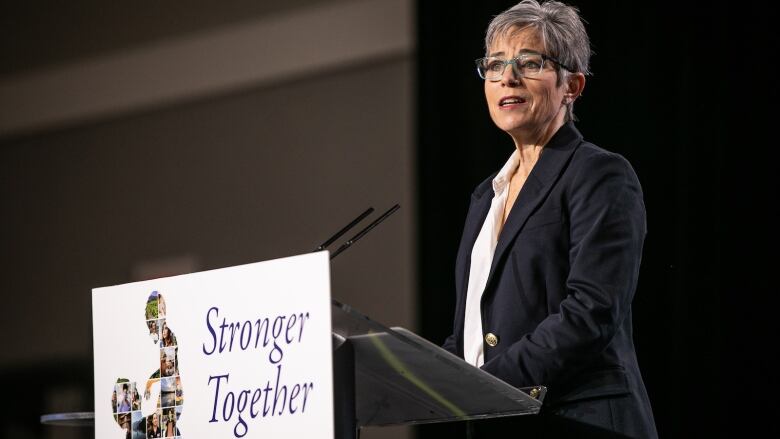B.C. forecasts $5.5 billion deficit in coming year
Province cites recovery from pandemic, wildfires and flooding as reasons why B.C. is staying in the red

The B.C. government is projecting deficits over the next three years, despite an economy that has recovered from the start of the pandemic faster than expected.
Finance Minister Selina Robinson announced a $5.5 billion deficit planned for the 2022/2023 fiscal year, along with a $4.2 billion deficit in 2023/2024 and a $3.2 billion deficit in 2024/2025.
The current year's deficit is now forecast to be $483 million, after it was projected at the start of the fiscal year to reach $9.7 billion.
But Robinson cautioned that the bulk of the province's economic recovery had already transpired. And she said continued spending on pandemic recovery and new spending to respond to flooding and wildfire disasters were part of the reason for continued deficit spending going forward.
"When there are challenges that threaten us as a province, we must respondas a province," she said.
"Some argue that cuts and reduced role for government is the right way forward. But that's not what most British Columbians expect. And that will not be our approach."
Where is the new spending?
While there were no large new programs or spending items announced in this year's budget, the province announced a number of new funding commitments in future years, including:
- $663 million over three years to prevent and respond to homelessness, including expanding supports to youth aging out of care to their 27th birthday.
- An increase of $100 million a year in the province's child-care plan, which the government says will get the average child-care fees to $20 a day by the end of the year.
- $289 million over five years to connect more rural, remote and Indigenous communities to high-speed internet.
But the largest one-time spending items are reflective of some of the historical challenges B.C. is facing: $2 billion has been allocated in pandemic recovery contingencies for the next year, $400 million has been allocated for flooding recovery (including another $400 million in contingency costs), and around $170 million more per year is being budgeted for wildfire management, prevention projects, and the province's climate preparedness and adaption strategy.
"There is a long road ahead, as we all rebuild and repair the damage left by these difficult times," said Robinson.
Capital spending up
In addition to continued annual deficits, the province is also forecasting a large increase in its total debt: from $91.6 billion this fiscal year to $125.8 billion in 2024/2025.
Much of this is due to a record-high $27.4 billion in taxpayer supported capital spending in the next three years, including completing the Site C Dam, the Millennium Line SkyTrain extension in Vancouver to Arbutus Street, and the building or improvement of several highways, schools, or supportive housing programs.
Robinson said that while the amount of debt "is a concern we will monitor closely," she argued that the province's debt-to-GDP ratio remained in a stronger position than other provinces, and that the province's overall approach was balanced.
"The state of our economy is not only about our economic growth and our fiscal strength," she said, "but how that growth is shared throughout the province."












_(720p).jpg)


 OFFICIAL HD MUSIC VIDEO.jpg)
.jpg)



























































































